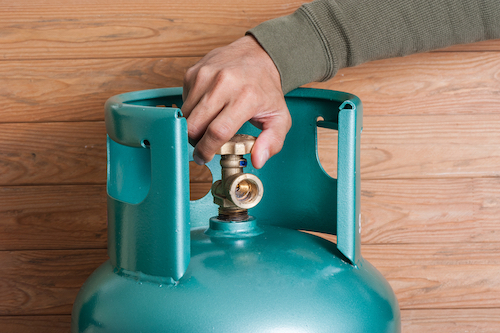
Propane is the most common fuel for industrial, engine-powered equipment. Whether it's used for a propane ride-on floor scrubber, rider floor sweeper, or forklift, most facilities need to store, use and/or transport propane tanks. Large facilities, such as warehouses, distribution centers, and factories utilize large fleets of machines and will have 30 or 40 tanks that require proper care and maintenance to not only ensure a long life but also ensure the safety of everyone around. OSHA dictates that a casually used propane tank should last 10 years, but poor maintenance can lead to issues with valves, connectors, and so on. Here you'll learn a bit about how to properly care for and maintain your tanks so you can extend their life.
Why Propane?
Propane, also known as liquified petroleum, liquid propane, or LP, is a popular fuel for several reasons. For one thing, most forklifts are LP-powered and therefore having your scrubbers and sweepers use the same power source is super convenient. It's very easy to refill a tank. Also, a well-maintained propane ride-on floor scrubber or sweeper typically lasts up to 10,000 hours. There is virtually no downtime when compared to battery-operated units, and a propane ride-on floor scrubber tends to have sustained power on graded surfaces, making it great for parking garages. An LP rider floor scrubber such as the Tennant T20, a sweeper like the PowerBoss Atlas, or a combination unit like the Tennant M30 are all incredibly efficient machines to have in your facility. That being said, with great efficiency comes great responsibility. OSHA mandates on propane tanks are strict, and for good reason. Whether you have one propane rider floor scrubber or an entire fleet, one fact remains the same: propane is a hazardous, flammable material that is stored in a pressurized environment. Improper care results in lives lost.
Safe Propane Storage and Use
Industrial facilities can store propane cylinders in buildings, but not in buildings frequently visited by the general public. There's a cap of 300lbs unless the facility has propane-only storage located in special buildings or rooms. The cap in those situations is 10,000lbs. Here are a few more tips on storage:
- Store tanks away from exits, stairways, entryways, and high-traffic areas.
- Store away from other flammable or combustible materials.
- Tanks should be stored off the ground on flat areas that won't burn or collect water.
- Tanks need to be in highly ventilated areas.
- Tanks must be kept away from heat sources.
- Store in the proper orientation, with the relief valve in direct contact with the vapor space (Cylinders can be stored either vertically or horizontally. When stored horizontally, the relief device must be in the 12 o’clock position.)
- Tanks must be secured to prevent falling.
- Remember that empty tanks can be just as dangerous as full ones.
Tips for Proper Propane Tank Care and Maintenance
- Always follow the manufacturer’s instructions.
- Check the dates on the collar periodically to ensure you've not yet reached the requalification date. Replace if out of date.
- Check for leaks as well as signs of rust, even if well under the requalification date.
- Keep fire extinguishers within easy reach of tanks.
- Protect container valves from turning accidentally. Set them into the recess or fasten a ventilated cap or collar so that any accidental bump or fall doesn't affect the valve or other connection.
- Store securely upright during transport.
- Allow only trained and authorized personnel to replace containers.
- Avoid metal tools when changing the cylinder.
- Do not roll, drag, or drop cylinder or use excessive force when opening the valve.
- Routinely check for leaks.
When you're around heavy equipment all day such as propane floor scrubbers and sweepers or the like, it's easy to become comfortable and therefore complacent. However, a lax attitude toward propane storage is not only a safety hazard, but it's also going to put your LP floor scrubbers on the fast track to a short tank life. The list of OSHA requirements is long, but making sure you and your company remain compliant is essential to running a safe workplace.

